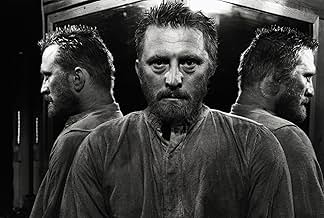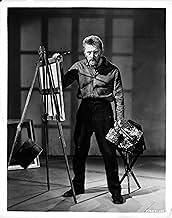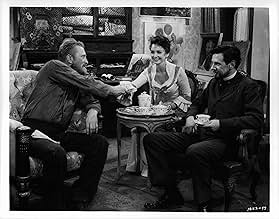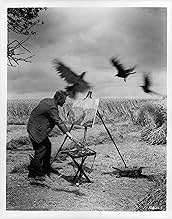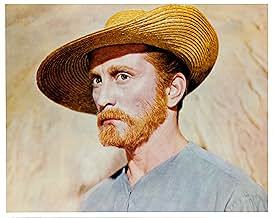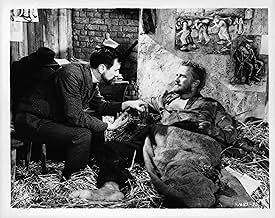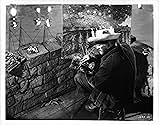NOTE IMDb
7,3/10
13 k
MA NOTE
La vie de Vincent van Gogh, artiste brillant mais torturé.La vie de Vincent van Gogh, artiste brillant mais torturé.La vie de Vincent van Gogh, artiste brillant mais torturé.
- Réalisation
- Scénario
- Casting principal
- Récompensé par 1 Oscar
- 4 victoires et 6 nominations au total
Avis à la une
I've seen this movie several times now, and every time with enjoyment and great appreciation.
The acting by Douglas and Quinn is truly first rate. It's a shame Douglas didn't get the best actor Oscar for which he was so deservedly nominated, but competition that year in that category was fierce. He truly makes you feel van Gogh's frightened agony, both at not being able to achieve what he wanted in his art and his fear of approaching insanity. (It ran in van Gogh's family; he knew what was coming.)
But I also enjoy the great efforts made to reproduce the scenes van Gogh painted, whether in Holland, Arles, or outside Paris. That couldn't have been easy, but if you know van Gogh's work, it really adds to the effect the movie makes.
There are times when the characters speak like an art history textbook - though those painters did love to discuss their theories on art, as you see in their letters.
Still, I consider this to be one fine movie. Whether it gives an accurate depiction of van Gogh or Gauguin is beside the point. It's based on a novel by Irving Stone, who didn't hesitate to change facts to make for a book that would sell; it's not a BBC documentary, and shouldn't be judged as such. It does a great job of showing us the torments of a great painter, and gives us some idea of what van Gogh was up to. That's more than enough for me.
The acting by Douglas and Quinn is truly first rate. It's a shame Douglas didn't get the best actor Oscar for which he was so deservedly nominated, but competition that year in that category was fierce. He truly makes you feel van Gogh's frightened agony, both at not being able to achieve what he wanted in his art and his fear of approaching insanity. (It ran in van Gogh's family; he knew what was coming.)
But I also enjoy the great efforts made to reproduce the scenes van Gogh painted, whether in Holland, Arles, or outside Paris. That couldn't have been easy, but if you know van Gogh's work, it really adds to the effect the movie makes.
There are times when the characters speak like an art history textbook - though those painters did love to discuss their theories on art, as you see in their letters.
Still, I consider this to be one fine movie. Whether it gives an accurate depiction of van Gogh or Gauguin is beside the point. It's based on a novel by Irving Stone, who didn't hesitate to change facts to make for a book that would sell; it's not a BBC documentary, and shouldn't be judged as such. It does a great job of showing us the torments of a great painter, and gives us some idea of what van Gogh was up to. That's more than enough for me.
Lust For Life may look, at first glance, to be a typical Hollywood biopic, which is usually not much more than a star vehicle about a famous, real-life but vacuously recreated character, denuded of any real personality. Minelli certainly makes his biopic of Vincent Van Gogh with his trademark lavishness. But, importantly, he does not glamorise his subject. Instead, he makes a visually rich but earthy film, which exalts Van Gogh's achievement and seeks to portray the realities of his creative life and the dark side of his personality.
Lust For Life focuses on the extremely troubled man Van Gogh was, at turns listless, priggish, childish, needy, manic and quick-tempered; but also sensitive, caring, thoughtful, romantic and altruistic. Kirk Douglas is superb as Van Gogh, holistically exhibiting his various and contradictory aspects: obsessive though circumspect artist, diffident but passionate friend, forlorn romantic and dangerous maniac. It is all the more of an accomplishment as he is such a muscular, good-looking leading actor (nor should Anthony Quinn's key supporting performance as Gauguin, a macho with hidden sensibilities, be neglected).
However, at the same time, what the film never forgets is Van Gogh's considerable achievement. Minelli's iridescence complements Van Gogh's colourful, vivacious visual style, and many of his paintings are shown throughout the film.
Critics have pointed to the over-use of melodrama in the film. Yet Lust For Life is rare in that the film is consummated by its melodrama, along with Miklós Rózsa's grand, sweeping music. In other words, its melodrama succeeds, making the viewer identify more with Douglas' Van Gogh, giving him a greater, but also justified, pathos and sense of tragedy.
Lust For Life is the best Hollywood Biopic
Lust For Life focuses on the extremely troubled man Van Gogh was, at turns listless, priggish, childish, needy, manic and quick-tempered; but also sensitive, caring, thoughtful, romantic and altruistic. Kirk Douglas is superb as Van Gogh, holistically exhibiting his various and contradictory aspects: obsessive though circumspect artist, diffident but passionate friend, forlorn romantic and dangerous maniac. It is all the more of an accomplishment as he is such a muscular, good-looking leading actor (nor should Anthony Quinn's key supporting performance as Gauguin, a macho with hidden sensibilities, be neglected).
However, at the same time, what the film never forgets is Van Gogh's considerable achievement. Minelli's iridescence complements Van Gogh's colourful, vivacious visual style, and many of his paintings are shown throughout the film.
Critics have pointed to the over-use of melodrama in the film. Yet Lust For Life is rare in that the film is consummated by its melodrama, along with Miklós Rózsa's grand, sweeping music. In other words, its melodrama succeeds, making the viewer identify more with Douglas' Van Gogh, giving him a greater, but also justified, pathos and sense of tragedy.
Lust For Life is the best Hollywood Biopic
When I hear the name Vincente Minnelli certain scenes pop up on my inner screeningroom: A tracking shot at the fair (Some came running), the low tracking zoom towards Douglas and Turner at the pool (Bad and the Beautiful), snowmen (Meet me in St Louis) and the agony in Douglas's face in "Lust for life"; in fact as soon as his redbearded agonized face pops up, all the other movies fade away and "Lust for life" takes over my inner screening room.
But apart from being my favorite Minnelli movie, its a movie that more than any other shows his genius in use of colors; every scene is composed in breathtaking technicolor with the deepest respect for Van Gogh's own use of color, and Douglas's acting is filled with the same agony and passion as the strokes of Van Gogh's brush. As the other great movies who uses color to its fullest (Wizard of Oz, Black Narcissus, Ten Commandments), the simularities between the director and the painter is obvious. Hence, Minnelli's struggle for "painting" the scenes with the richness of technicolor becomes an echo of Van Gogh. It also reads as a textbook in composition from Steinberg's Dead Space to Eisenstein's juxtapositions. In all, Minnelli is of great skill and uses it to the fullest.
The story, which focuses on the struggle for a new way of expression, is tame at times and the acting (apart from Douglas) seems static most of the times, but the tortured face and body of Douglas and the use of color makes this one of the greatest achievements in MGM's history and one of the best movies Minnelli ever made.
But apart from being my favorite Minnelli movie, its a movie that more than any other shows his genius in use of colors; every scene is composed in breathtaking technicolor with the deepest respect for Van Gogh's own use of color, and Douglas's acting is filled with the same agony and passion as the strokes of Van Gogh's brush. As the other great movies who uses color to its fullest (Wizard of Oz, Black Narcissus, Ten Commandments), the simularities between the director and the painter is obvious. Hence, Minnelli's struggle for "painting" the scenes with the richness of technicolor becomes an echo of Van Gogh. It also reads as a textbook in composition from Steinberg's Dead Space to Eisenstein's juxtapositions. In all, Minnelli is of great skill and uses it to the fullest.
The story, which focuses on the struggle for a new way of expression, is tame at times and the acting (apart from Douglas) seems static most of the times, but the tortured face and body of Douglas and the use of color makes this one of the greatest achievements in MGM's history and one of the best movies Minnelli ever made.
This film is a rarity, a biopic which is more accurate than the book it's based on. Irving Stone's book was a major best-seller which did much to make Vincent Van Gogh one of the ten most famous artists in history but it did have its inaccuracies, particularly when it depicted its protagonist in Paris with other great painters of the time. In the book, Gauguin, Lautrec, Cezanne and Rousseau come off as typical bohemians while Vincent was made much more of a leader than he was. Minelli doesn't give us a detailed look at any of the artists except Gauguin but he is more accurate about who influenced Van Gogh and he does include his best friend, the now-forgotten Emile Bernard, if only as an extra in Tanguy's shop.
When Lust for Life came out, several critics dismissed it as too lurid and melodramatic, but those adjectives are accurate in describing Van Gogh's life. Note that Kirk Douglas does not play his usual cool, fun-loving tough guy and actually uses his whole body in his acting. For once Hollywood outdid itself.
When Lust for Life came out, several critics dismissed it as too lurid and melodramatic, but those adjectives are accurate in describing Van Gogh's life. Note that Kirk Douglas does not play his usual cool, fun-loving tough guy and actually uses his whole body in his acting. For once Hollywood outdid itself.
This is one of my favorite films. It deeply touched me. It's in my top 20 for sure. Maybe top 10. The acting, directing, and production are all about as good as it gets. It's a shame Kirk Douglas didn't win the best actor Oscar. I think it's his finest performance. I can't think of a single bad thing to say about this great movie. It's a vivid (and accurate) tribute to the immortal Vincent.
Le saviez-vous
- AnecdotesMany of the locations used for filming were the actual locations Vincent van Gogh visited in his life.
- GaffesAt Arles, when Paul Gauguin is explaining his philosophy, Vincent mistakes him for Theo saying "but Theo, err Paul..." However, this is in the script. The whole point of the line is that Van Gogh views his conversation with Gauguin as nothing more than an extension of talks he's had with Theo since childhood.
- Citations
Paul Gauguin: I'm talking about women, man. Women. I like 'em fat and vicious and not too smart. Nothing spiritual either. To have to say 'I love you' would break my teeth. I don't want to be loved.
Vincent Van Gogh: You really mean that, Paul.
- ConnexionsFeatured in Van Gogh: Darkness Into Light (1956)
- Bandes originalesLa Marseillaise
(1792) (uncredited)
Written by Claude Joseph Rouget de Lisle
Played by a band in France, near the end
Meilleurs choix
Connectez-vous pour évaluer et suivre la liste de favoris afin de recevoir des recommandations personnalisées
Détails
Box-office
- Budget
- 3 227 000 $US (estimé)
- Durée
- 2h 2min(122 min)
- Rapport de forme
- 2.55 : 1
Contribuer à cette page
Suggérer une modification ou ajouter du contenu manquant

![Regarder Trailer [OV]](https://m.media-amazon.com/images/M/MV5BNjMwYjdhMDItMDA1NC00YjJlLWFhZjctYWY5YjBlNDdiODFiXkEyXkFqcGdeQXRyYW5zY29kZS13b3JrZmxvdw@@._V1_QL75_UX500_CR0)
